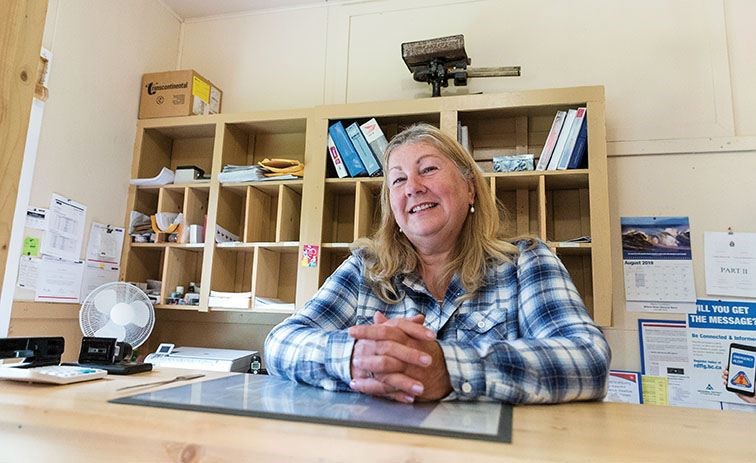It's 10 o'clock on a Monday morning and the old Longworth school house, now the post office, is a hub of activity.
There are two cars and an ATV in the parking lot.
For a town with a population of 21.
"Looks like it's going to be busy," Post mistress Robin Wills says with a smile, scanning the four other people in the room.
There are long tables set in a square in the middle of the room with chairs at the ready. There are handmade quilts, crocheted blankets, handknit scarves, cloth dolls, rustic postcards and fruit preserves on display along the walls.
Everything's for sale.
The coffee station is in the far corner and most everyone eventually makes their way to it.
As more people trickle in, they deposit their contributions on the table. Cookies in a Tupperware container, banana bread on a paper plate, fancy cookies in a tin.
About a dozen people settle in for a chat over coffee.
This is what it looks like three mornings a week in Longworth, 160 km east of Prince George.
There's talk of someone needing eggs, another's hand goes up signalling she's got some to spare.
The give and take of a 21-person town already starts to show.
"If I had a tape recorder I could push play right now because we're going to hear the same old stories," Robin teases.
But those stories are new to some people at the table. Dave, a retired forest service worker from Clearwater who spent a short time in Longworth in 1959, has stopped by to visit. He's on a road trip to Alaska and thought he'd make the trek to see the town that made such an impression so long ago.
Longworth is 99 years old and the big news is the townspeople are talking about hosting an open house next summer to celebrate the centennial.
There's going to be a barbecue and the invitation is open for anyone who might be interested. There's no date set yet but all those details will be put in place soon.
In its heyday, when logging was in full swing in the 30s and 40s, there were upwards of 1,000 people living there. Longworth started as a stop on the Eastline of the Grand Trunk Pacific Railway, before it became the Canadian National Railway. The train station was demolished in 1969. Longworth lies between Sinclair Mills and Penny and had a smaller sawmill than the one at Penny. Longworth is located on the northeast side of the Fraser River.
There was no water or power in Longworth until the road was built in 1989. Before that, people had to cross the river to get in and out of Longworth. Phone service wasn't available until 1999.
One resident disagreed about one thing.
"Grace and I have always had running water," Les Apps deadpans. 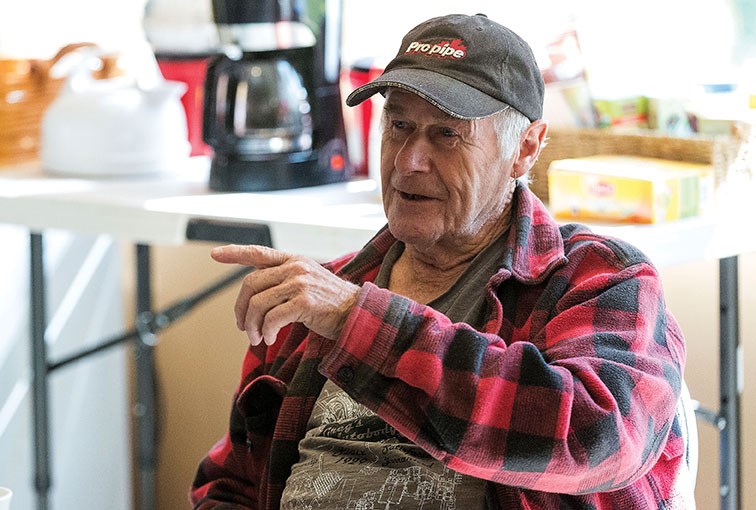
"Put the water in the bucket and run," Les and Grace chime together and laugh.
It's the longest "running" joke between them.
The McCoy brothers - Bob, 77, and Dave, 79 - are sitting with their friends at the table reminiscing about the days they would have to load their inebriated teacher into a wheelbarrow at their house because they were too little to pack her to her house any other way. They were about 10 and 12 years old at the time.
Bob and Dave, along with brother Wayne, 76, have lived in Longworth most of their lives and say they wouldn't have it any other way.
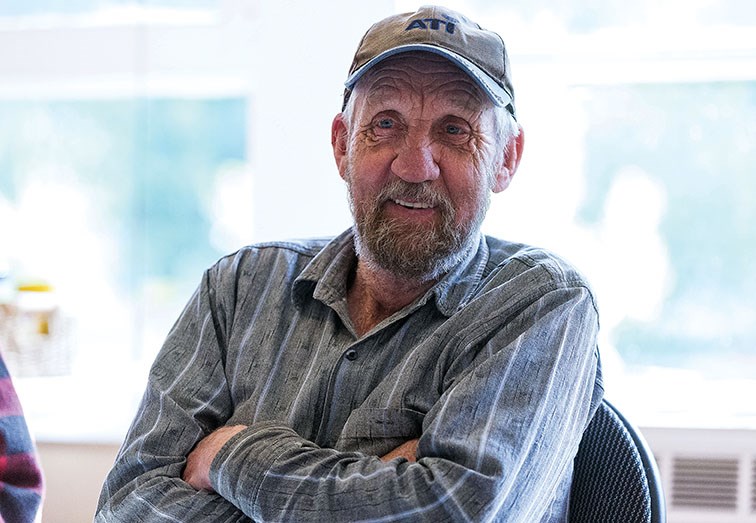
Back in the day, the brothers helped build and maintain ice roads in the winter. Plank roads were built in the muddy spring and fall to get the logs out of the forest and onto the railway cars.
A unique kind of fun was had right up until the 80s as residents pushed their luck in the spring to see if they could cross the river with their vehicle on the ice road one last time before break up. People could be seen driving across the partially melted ice road with their doors open ready to make a quick getaway if things went sideways.
There was lots of talk about having to pull each other out of the shallows if they got stuck, borrowing a loader if it was a bigger truck that needed a tow.
Many a tale started with "remember when we had to pull so-and-so out of the river that time?"
Many a tale ended with "that was so much fun."
Some of the stories of how people got to Longworth are quite rare in their own right.
Gundula Myer-Eppler Rabien's dad, Hans, literally flipped a coin in Berlin. The choice was North or South America. Once that was settled, he then turned a map over and poked a needle through it. She has had a 65-year love affair with Longworth ever since those fateful choices were made.
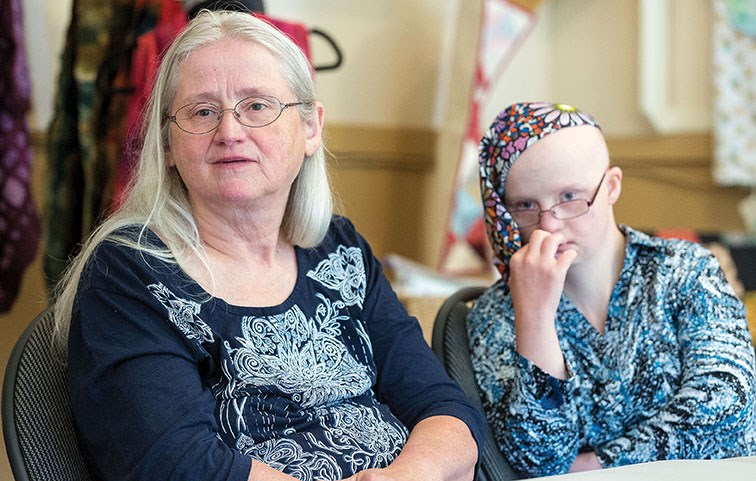
She grew up there and then spent 35 years in Germany only to return because she was homesick and has now spent the last 10 years in Longworth. She's leaving her beloved home for the last time to return to Germany permanently because of her 22-year-old daughter Fiona's extensive medical needs.
Viv Tolley is a former Floridian whose truck driving younger brother passed through Longworth years ago. He laid eyes on Big Jim Tolley and knew he was the fellow for his widowed sister.
"My brother came back to Florida to tell me about this bachelor-person up there," Viv says with mischief in her eyes. "He knew I liked the country and I liked the quiet, and knew that I would like to live like they did 80 to 100 years ago and he led me up here and showed me the beautiful views."
She drove her big motorhome from Florida to Longworth in 1994 and has lived there ever since.
Viv is proud to say she's the oldest female in Longworth at 80 years old.
"It's the most beautiful place in the world," Viv says about Longworth. And she should know, she said, because she's been all over Europe and even visited the Swiss Alps and still knows it's the most beautiful place.
Big Jim and Viv are snowbirds and travel to Florida to be with her children every winter.
"We've got a wild bunch up here," Viv says, looking around the table at her many friends.
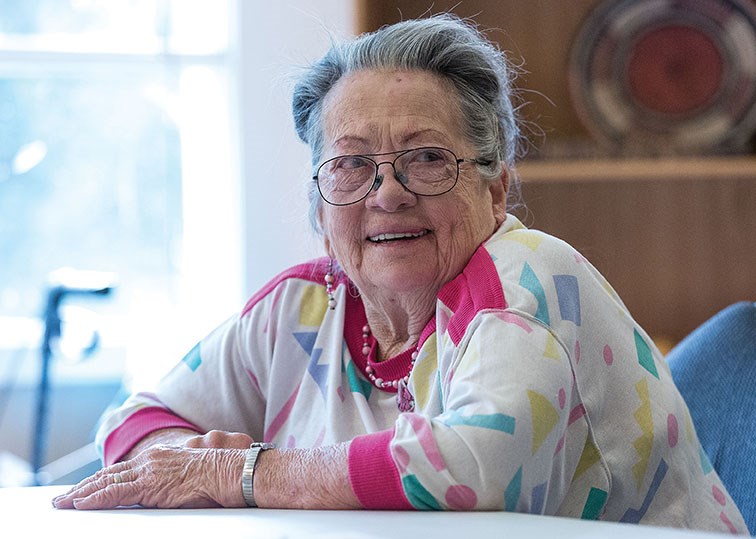
Les and Grace Apps bought property in Longworth in the 80s and moved to it full time when Les retired in 1997.
When people moved into the area before the road was built in 1989, it was trips across the river but that didn't stop them from wanting their vehicles and toys brought over.
One guy wanted his motorcycle on the other side of the river and the weight was too much for the boat. It sunk.
"Big Jim and I spent three or four days going down the river with hooks before we found it," Les says. "We got the motorcycle and brought it to shore between two boats. They drained it out and had it going the next day."
Talk turns to the days when babies were born on kitchen tables and neighbours would gather to help. When one young mother tried to make it to town to have her baby, he was born on the train and the town nicknamed him Caboose. That memory brings on a hearty laugh from those gathered around the table.
It's a different kind of lifestyle where everyone relied on one another to succeed and not much has changed that way.
"Most everyone comes for coffee on days the post office is open and when someone doesn't show up for a while, we all check in with each other and if no one has heard from that person then someone will go pay a visit to make sure they're OK," Robin explains.
It's an aging population in Longworth now.
"Pretty much 99 per cent of the population of Longworth is over 50 years old," Robin says.
In the most recent years the community has supported each other in many ways, not only coming together for coffee to check in with each other three times a week but also to celebrate special occasions together like Easter, Thanksgiving and Christmas. They gather at the Community Hall, the only other public building in Longworth, besides the school house turned post office.
"There's always a poltuck for special occasions," Gundula says. "And the Eastline often does stuff together."
The Eastline includes Willow River Sinclair Mills, Longworth and Penny, which are all along the Fraser River.
"Our Christmas potluck is huge," Gundula says.
The community hall saw about 80 people in it last year.
"And all the kiddies get gifts," she adds. During the dinner, one or two quilts get raffled off and proceeds go towards the children's gifts for the next year.
"The great thing about it is that you just about know everybody from here to Prince George," Robin says. "We all know each other's names and where we live and it's almost like you feel they just live down the road."
Gundula had a little dog come visit her place just the other day. All it took was a few phone calls to her neighbours and the owner was found and reunited with his dog within minutes, she says.
"During any kind of crisis everybody bands together," Grace says. She recalled a fire taking a neighbour's home years ago and within days residents had given enough materials to build again and then they did.
During the winter, many of the women meet weekly for a traditional quilting bee.
"The women get together to make the (raffled) quilts and we shovel the driveway," Les smiles.
Instead of going anywhere else, organizers of events in Sinclair Mills will come to Longworth and buy the handmade items for the draws they hold as fundraisers, Robin says.
From June to September, the Eastline Market is held in Willow River, 70 minutes' drive from Longworth. Several members of the small town sell their homemade wares every week while others travel there to support them. In other words, the same items for sale at the Eastline Market are also available at the Longworth post office. So instead of making purchases at the post office just an ATV ride away, neighbours and friends all travel to the market more than an hour away.
Bob McCoy's wife Iris sells handwoven mats, purses, vegetables and preserves at her booth at the market while Robin and husband Terry set up a booth to showcase her handmade quilts, jams, jellies and eggs when she's got them. The Tolleys make the drive down to the market and buy from them and visit with friends.
"I would much rather buy homemade jams and jellies from the local people than anything they have in a store in town because nothing there is nearly as good as the homemade stuff," Viv says. "And you're helping your neighbours out at the same time. It really is a beautiful way of life."
